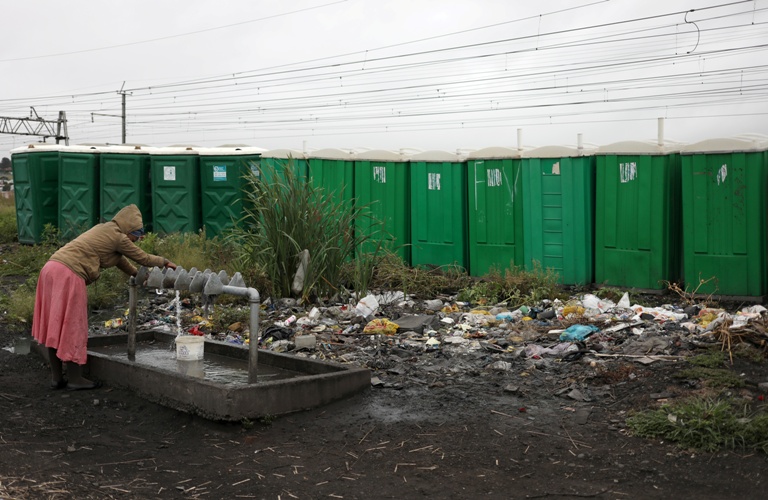
Faeces in the Kitchen: South Africans Call for Better Sewage Systems
Raw excrement, condoms and sanitary products regularly spill into homes and parks for many South Africans… who are just some of about 4.5 billion people globally without safe sanitation, promised for all by 2030. Residents are lobbying for urgent rehabilitation of sewage works by South Africa’s Department of Water and Sanitation, widely criticised for lack […]

Raw excrement, condoms and sanitary products regularly spill into homes and parks for many South Africans… who are just some of about 4.5 billion people globally without safe sanitation, promised for all by 2030.

Residents are lobbying for urgent rehabilitation of sewage works by South Africa’s Department of Water and Sanitation, widely criticised for lack of investment, non-payment of contractors, poor revenue collection, water theft and leakage.
“We have had water flowing into our street and home for the last three years,” Heather Crosley, who lives in Johannesburg, told the Thomson Reuters Foundation in an interview in the lead-up to Friday’s World Water Day.
“When it rains heavily, the manhole lids blow off; sewage rushes down the road and sometimes comes into our kitchen. We have found condoms, tampons and faeces in our kitchen on more than one occasion.”
Under global development goals agreed in 2015, governments pledged to provide access to water and sanitation for all by 2030. But three in 10 people worldwide do not have a water source free from faecal and chemical contamination.
The spokesman for the water department, Sputnik Ratau, said setting up an independent regulator to improve management was “paramount”, although he did not have a specific timeline.
“The Ministry and Department are seized with the work of ensuring this comes to pass,” he said.
Access to water is a hot topic in South Africa – and a growing number of countries hit by climate change, burgeoning populations and poor governance – as drought last year triggered warnings that Cape Town’s taps could run dry.
In Johannesburg’s Soweto township, residents often see untreated wastewater and excrement flow into tributaries that lead to the Vaal River, one of the country’s main water sources.
In an episode of Carte Blanche last year, the current affairs show found that the situation at the Vaal River – which provides a major source of water for Gauteng – has reached crisis levels as raw sewage continues to spill onto land and into the river, posing a threat to the drinking water of 45% of Gauteng’s population.
According to the expose by Carte Blanche, streets in the Vaal Triangle are filled with refuse and there are streams of raw sewage. Conditions are so horrendous apparently that even rats are dying.

“In Snake Park, sewage is currently flowing into a community-built park so the children have nowhere safe to play,” said community activist Tiny Dlamini.
Untreated water can cause diarrhoea and cholera, which can be fatal, particularly for children.
Experts speaking to Carte Blanche warned that time is running out for what could become a national crisis.
About 56 percent of South Africa’s wastewater treatment works are in a poor or critical state, said Mariette Liefferink, head of the Federation for a Sustainable Environment, which campaigns against water pollution caused by mining.
“This is a perfect storm of mismanagement that currently impacts 14 million South Africans without access to decent sanitation,” said Christine Colvin, a water expert with the World Wide Fund for Nature South Africa.
(Reporting by Kim Harrisberg @kimharrisberg, Editing by Katy Migiro – Thomson Reuters Foundation. Visit http://news.trust.org)
WATCH the water catastrophe, as revealed on Carte Blanche last year:
After the break on #CarteBlanche: raw sewage is flowing freely down the #Vaal river, leaving countless struggling and the environment suffering. What is govt doing to prevent a very imminent environmental and humanitarian crisis? @clairemawisa brings us this story. pic.twitter.com/DVxQXuAFVK
— Carte Blanche (@carteblanchetv) July 29, 2018
